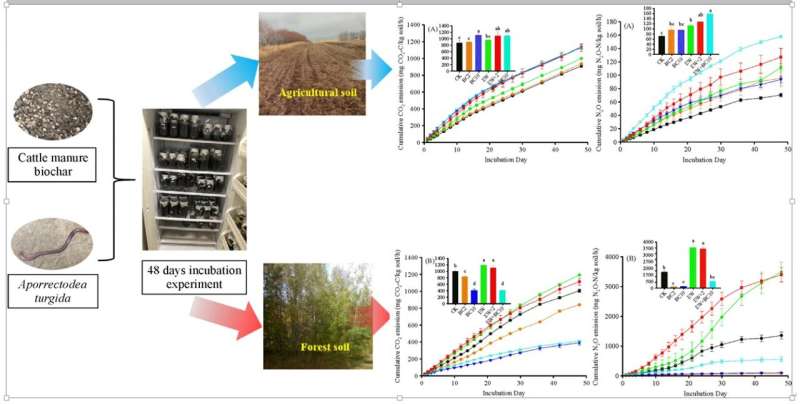Cattle manure biochar could offset earthworm greenhouse gas emissions in forest soil

As two important greenhouse gases, about 20% and 62% of global carbon dioxide (CO2) and nitrous oxide (N2O) emissions originate from the soil, especially agricultural and forest soils. Therefore, it is necessary to explore sustainable management strategy to decrease soil CO2 and N2O emissions.
Soil fauna, especially earthworms, may significantly influence soil biogeochemical processes and greenhouse gas emissions. In another aspect, raising beef cattle inevitably generates a large amount of cow manure, which, if not properly handled, will pollute surface water and groundwater, and generate large amounts of greenhouse gases during storage and processing. The conversion of cow manure into biochar by pyrolysis can be used to remove various pollutants and improve soil fertility. Soil amendment with cow manure biochar can significantly affect soil greenhouse gas emissions and improve soil quality.
The activities of earthworms were affected by the amount of biochar addition, which in turn affected soil CO2 and N2O emissions. Aporrectodea turgida is one of the most common earthworm species in North America. However, little information is available on the contribution of this earthworm and its interaction effect with biochar to CO2 and N2O fluxes in agricultural and forest soils.
Now, a research group from University of Alberta, Beijing Forestry University and Tsinghua University studied the effects of cow manure biochar and earthworms on soil CO2 and N2O emissions and soil physicochemical properties through the incubation experiment. The results were published in Frontiers of Environmental Science & Engineering.
They found that CO2 and N2O emissions promoted from agricultural soil but reduced from forest soil through cow manure biochar addition. Earthworms also promoted CO2 and N2O emissions from both soils. Adding 10% cattle manure biochar could offset the activities of earthworms in the forest soil, reduce the emissions of CO2 and N2O, and the concentrations of NO3−-N and DON. Earthworm' activities including respiration, burrowing, feeding and excretion not only affect soil physical structure (e.g., improved aeration), but also promote microbial activity, resulting in increased CO2 and N2O emissions. It significantly affects forest soil pH as well. While the addition of biochar will change the pH of soil, increase the activity of N2O reductase within denitrifying soil microbial, and promote soil nitrification and denitrification, thereby affecting CO2 and NO2 emissions. Furthermore, the interaction of the cattle manure biochar and earthworm has a significant effect on the NH4+-N concentration of soil.
Therefore, just as the researchers considered, high rates of application of manure biochar should be a viable management option to reduce CO2 and N2O emissions and improve soil biochemical properties in forest soil.
More information: Xiaoqiang Gong et al, Cattle manure biochar and earthworm interactively affected CO2 and N2O emissions in agricultural and forest soils: Observation of a distinct difference, Frontiers of Environmental Science & Engineering (2021). DOI: 10.1007/s11783-021-1473-8
Provided by Higher Education Press


















